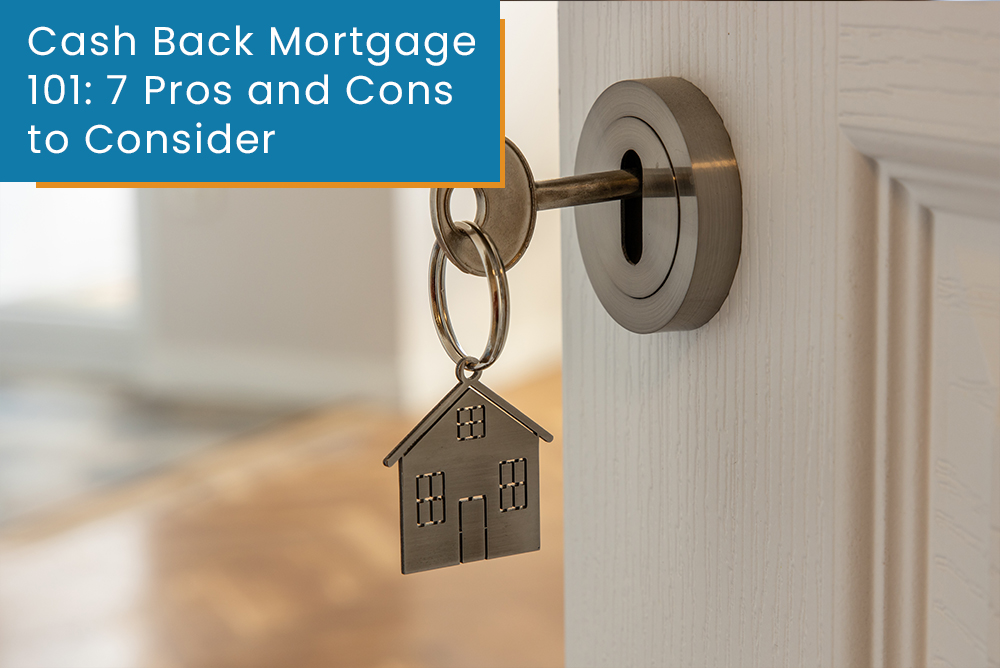
Cash Back Mortgage 101: 7 Pros and Cons to Consider
Tags:
Buying a new house is challenging. It takes a lot of planning and funds. In most cases, you arrange for the funds for the down payment on the new home through a loan from the bank or a mortgage brokerage, and the loan amount splits into monthly payments with some added interest. After the down payment, families are cash-strapped. The debt makes managing additional expenses, like renovations, repairs, and other bills, difficult.
This is where a cashback mortgage comes in. Cashback mortgage in Canada allows new homeowners to get a portion of their mortgage back in lump-sum cash when they finalize the mortgage. Before looking at the pros and cons of a cashback mortgage, it is essential to understand what it is and how it works.
What is cashback mortgage?
With a standard mortgage, the bank or a lender provides you with the funds to pay for the house you want to purchase, which is some percentage of the total cost of the property. For example, if you decide to pay 20% down for a house that costs 600,000, your down payment will be 120,000, and the rest is a loan from the bank.
A cashback mortgage is a mortgage wherein you get some percentage of the loan amount back in a lump-sum payment as a cheque or a bank transfer. For example, for a house that costs 600,000, you can give 20% as a down payment, meaning you will have to pay 120,000, and the remaining 480,000 would be a loan from the bank.
On this loan amount, you can get anywhere between 1% to 7% cash back when you finalize the mortgage, which means when the loan becomes final and distributed funds become available. Therefore, after you receive the loan amount, you will get an additional 4,800 to 33,600 as cashback as a bank transfer or cheque.
With cash back mortgage explained, let’s move on to the pros and cons of this type of mortgage.
Pros Of Cash Back Mortgage
Any extra liquid funds are always a blessing. A cashback mortgage allows you to have just that. After making the down payment, you may become more conservative with your expenses and even push back some necessary investments into the new home. Yet, with the cashback amount, you can do repairs/renovations, pay some bills, and even furnish the house.
Help with unplanned expenses. You anticipate expenses and prepare for them as a homeowner. However, accidental expenses could make things more challenging, especially when you have made a significant down payment. These expenses can be for unexpected plumbing repairs, an appliance breakdown, or some unexpected bill that pops up.
Cashback mortgages in Canada come with lower interest rates than other forms of loans. It includes auto loans, a credit card, or opening a line of credit.
The higher the loan amount, the higher the cashback. Since the cashback depends on the loan amount you require, a sizable loan amount will result in a significant cashback. However, you should understand the terms and conditions of the cashback mortgage before proceeding. In some cases, there is an upper limit to the cashback the lender will offer.
Cons Of Cash Back Mortgage
Higher mortgage rates. Cashback mortgages in Canada can come with significantly higher mortgage interest rates than standard mortgages. Interest rates apply to the complete loan amount and not just the cash back you receive. It means in the long run, you will end up paying more. In most cases, you pay more over time in interest than the amount you receive upfront.
You need to qualify for a cashback mortgage in Canada. Typically, the requirements for a cashback mortgage include reliable employment with an hourly rate, which means it is more difficult for self-employed individuals to get approved.
A credit score of at least 650 is also required. Furthermore, getting approved for a cashback mortgage is challenging if the extent of purchasing the home is renting it out.
There are penalties for cashback mortgages in Canada. If you break your cash-back mortgage, you may have to pay back some or all of the cash you received as part of the cashback, which will be in addition to the prepayment penalty. A prepayment penalty is a fee that lenders charge if you pay all or part of your mortgage loan off before the duration you took the initial loan.
Should you get cash back mortgage?
Even though cashback mortgages in Canada have drawbacks, the upfront funds are helpful for most people. They can supplement your income while you recuperate from the heavy down payment.
The interest rates for cashback mortgages are typically higher. However, the extra amount will only be paid in the long run, giving you sufficient time to grow your finances and not feel the pinch of the additional amount you would have to pay.
Cash Back Mortgage 101: Final Thoughts
There are some pros and cons to cashback mortgages in Canada, and you, as a new homeowner, should take the time to understand all the details before signing the contract. Conduct your research and find the right balance between the best interest rates and the best cashback amount.
Our experts can help you every step of the way so you make the right decision. So, don't hesitate to contact Canadalend for the best expert advice. For more information about different types of mortgages, call Canadalend at 1-844-586-0713 or contact us here.